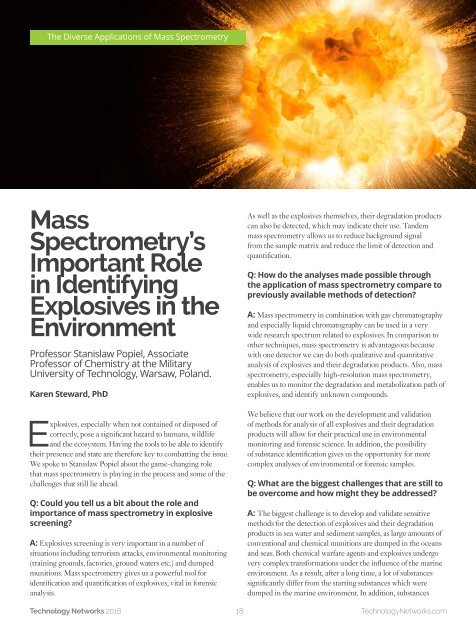004-Mass Spec-V17
Create successful ePaper yourself
Turn your PDF publications into a flip-book with our unique Google optimized e-Paper software.
The Diverse Applications of <strong>Mass</strong> <strong>Spec</strong>trometry<br />
<strong>Mass</strong><br />
<strong>Spec</strong>trometry’s<br />
Important Role<br />
in Identifying<br />
Explosives in the<br />
Environment<br />
Professor Stanislaw Popiel, Associate<br />
Professor of Chemistry at the Military<br />
University of Technology, Warsaw, Poland.<br />
Karen Steward, PhD<br />
Explosives, especially when not contained or disposed of<br />
correctly, pose a significant hazard to humans, wildlife<br />
and the ecosystem. Having the tools to be able to identify<br />
their presence and state are therefore key to combatting the issue.<br />
We spoke to Stanislaw Popiel about the game-changing role<br />
that mass spectrometry is playing in the process and some of the<br />
challenges that still lie ahead.<br />
Q: Could you tell us a bit about the role and<br />
importance of mass spectrometry in explosive<br />
screening?<br />
A: Explosives screening is very important in a number of<br />
situations including terrorism attacks, environmental monitoring<br />
(training grounds, factories, ground waters etc.) and dumped<br />
munitions. <strong>Mass</strong> spectrometry gives us a powerful tool for<br />
identification and quantification of explosives, vital in forensic<br />
analysis.<br />
Technology Networks 2018<br />
18<br />
As well as the explosives themselves, their degradation products<br />
can also be detected, which may indicate their use. Tandem<br />
mass spectrometry allows us to reduce background signal<br />
from the sample matrix and reduce the limit of detection and<br />
quantification.<br />
Q: How do the analyses made possible through<br />
the application of mass spectrometry compare to<br />
previously available methods of detection?<br />
A: <strong>Mass</strong> spectrometry in combination with gas chromatography<br />
and especially liquid chromatography can be used in a very<br />
wide research spectrum related to explosives. In comparison to<br />
other techniques, mass spectrometry is advantageous because<br />
with one detector we can do both qualitative and quantitative<br />
analysis of explosives and their degradation products. Also, mass<br />
spectrometry, especially high-resolution mass spectrometry,<br />
enables us to monitor the degradation and metabolization path of<br />
explosives, and identify unknown compounds.<br />
We believe that our work on the development and validation<br />
of methods for analysis of all explosives and their degradation<br />
products will allow for their practical use in environmental<br />
monitoring and forensic science. In addition, the possibility<br />
of substance identification gives us the opportunity for more<br />
complex analyses of environmental or forensic samples.<br />
Q: What are the biggest challenges that are still to<br />
be overcome and how might they be addressed?<br />
A: The biggest challenge is to develop and validate sensitive<br />
methods for the detection of explosives and their degradation<br />
products in sea water and sediment samples, as large amounts of<br />
conventional and chemical munitions are dumped in the oceans<br />
and seas. Both chemical warfare agents and explosives undergo<br />
very complex transformations under the influence of the marine<br />
environment. As a result, after a long time, a lot of substances<br />
significantly differ from the starting substances which were<br />
dumped in the marine environment. In addition, substances<br />
TechnologyNetworks.com


